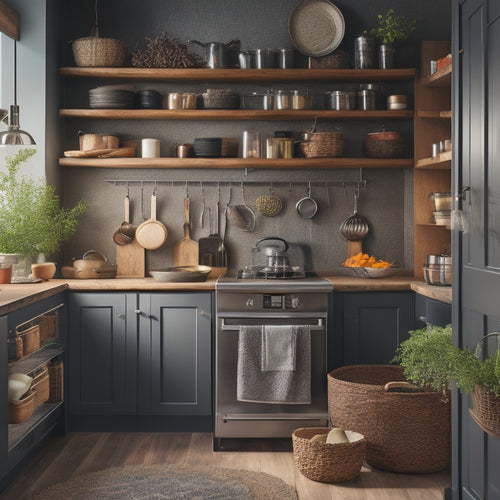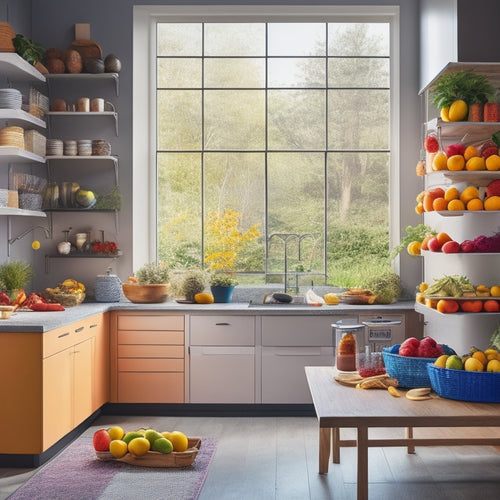
Food Safety: Tips for Storing Freshness
Share
Proper food storage is essential for maintaining freshness and preventing foodborne illnesses. Raw meat and poultry should be stored in sealed containers on the bottom fridge shelf, while potatoes and starchy foods should be kept in cool, dry places or refrigerated to prevent acrylamide formation. Organize your cupboard and pantry by storing dry goods in sealed containers, labeling them, and keeping them away from cleaning products. Follow guidelines for handling tinned and canned goods, and use suitable packaging materials for fruits, dairy products, and perishable items. By following these guidelines, you can take the first step towards ensuring your food remains fresh and safe to eat, and there's more to explore on this topic.
Key Takeaways
• Store raw meat in sealed containers on the bottom fridge shelf to prevent cross-contamination and bacterial growth.
• Keep potatoes in a cool, dry place or fridge to prevent acrylamide formation during high-temperature cooking.
• Use sealed containers and label them with contents and date to maintain safe and organized storage for dry goods.
• Refrigerate opened canned goods in clean containers and store tinned fruit in a cool, dry place to prevent contamination.
• Store perishable items like fruits and dairy products in breathable and airtight containers, respectively, and keep them below 40°F in the refrigerator.
Meat and Poultry Storage
Properly storing raw meat and poultry is essential to maintaining food safety. It prevents cross-contamination and the growth of harmful bacteria. To guarantee proper storage, raw meat should be stored in a sealed container on the bottom fridge shelf, following storage instructions on the label.
It is important not to consume meat past its use-by date. Additionally, cooked meat should be cooled quickly and refrigerated or frozen to prevent bacterial growth. Separating raw and cooked meat is crucial to prevent cross-contamination.
Storing Potatoes and Starchy Foods
When storing potatoes and starchy foods, it is crucial to think about the best conditions to prevent the formation of acrylamide, a potential carcinogen that forms when these foods are cooked at high temperatures.
Storing potatoes in a cool, dry place or in the fridge can help reduce acrylamide levels. A 2020 study showed that storing potatoes in the fridge does not significantly increase acrylamide.
It is also important to refer to the Food Standards Agency's advice on acrylamide. By taking these steps, you can minimize the risk of acrylamide formation and assure the safety of your stored potatoes and starchy foods.
Organizing Your Cupboard and Pantry
In addition to maintaining a safe and organized refrigerator and freezer, a well-organized cupboard and pantry are equally important for storing dry goods and securing food safety. Proper ingredient organization and food labeling are essential in preventing cross-contamination and spoilage.
| Best Practice | Why It Matters |
| Store dry goods in sealed containers | Prevents pantry pests and maintains food freshness |
| Label containers with contents and date | Secures easy identification and rotation of stock |
| Keep food away from cleaning products | Prevents chemical contamination of food |
| Avoid using containers for other purposes | Prevents cross-contamination of food |
| Reuse undamaged plastic water bottles after cleaning | Reduces waste and conserves resources |
Handling Tinned and Canned Goods
Storing and consuming tinned and canned goods safely requires attention to specific guidelines to prevent contamination and foodborne illness.
When it comes to tinned fruit preservation, checking the expiration date and storing them in a cool, dry place are essential. Recycling empty tins is also important to reduce waste.
For canned soup, be mindful of its shelf life and consider alternatives like homemade soup or frozen options. Always refrigerate opened canned goods in a clean container, and avoid reusing empty cans for cooking or storage.
Exceptions apply to foods with resealable cans, such as golden syrup. By following these guidelines, you can enjoy your tinned and canned goods while ensuring your safety and reducing waste.
Safe Food Wrapping and Storage
Proper food wrapping and storage play an essential role in maintaining freshness and preventing contamination, building on the importance of safe handling practices established for tinned and canned goods.
To make sure safe storage, follow these essential tips:
-
Fruit Preservation: Store fruits in breathable bags or containers to maintain humidity and prevent moisture buildup, ideal for fruit preservation.
-
Dairy Freshness: Store dairy products in airtight containers to prevent cross-contamination and maintain dairy freshness.
-
Proper Packaging: Use suitable packaging materials, such as cling film or aluminum foil, to prevent moisture and air from reaching the food.
- Cooler Storage: Store perishable items in the refrigerator at a consistent temperature below 40°F (4°C) to prevent bacterial growth.
Frequently Asked Questions
Can I Store Food in Plastic Bags From the Grocery Store?
While it's tempting to reuse grocery bags, it's best to choose dedicated food storage solutions like reusable containers or vacuum sealing to prevent cross-contamination and maintain peak freshness.
How Often Should I Clean My Fridge and Freezer?
Clean your fridge and freezer every 1-2 weeks to prevent cross-contamination and bacterial growth. Remove all contents, wipe surfaces with soap and warm water, and dry thoroughly to maintain a hygienic environment for stored food.
Are Glass Containers Better Than Plastic for Food Storage?
When considering food storage, glass containers are a superior option to plastic due to lower environmental impact, reduced health concerns, and long-term cost efficiency, despite higher upfront costs, thanks to their durability and non-porous nature.
Can I Use Aluminum Foil to Store Acidic Foods Like Tomatoes?
When storing acidic foods like tomatoes, avoid using aluminum foil as it can react with acidity, causing flavor and texture changes. Instead, opt for glass or plastic containers, ensuring airtight seals to maintain freshness and prevent food spoilage.
How Long Does It Take for Food to Spoil at Room Temperature?
At room temperature, the fate of your food hangs in the balance, as spoilage can occur rapidly. Perishables like meat, dairy, and eggs have a limited shelf life, spoiling within hours, while other foods can last days or weeks, depending on factors like humidity and packaging.
Related Posts
-

Over-The-Door Kitchen Storage for Apartment Living
Over-the-door kitchen storage is a smart solution for apartment living, allowing you to maximize vertical space while...
-

Space-Saving Tiered Racks for Kitchen Storage
Space-saving tiered racks are your best solution for maximizing kitchen storage. They employ vertical space, allowing...
-

Space-Saving Kitchen Solutions for Busy Homeowners
To maximize your kitchen's potential, start with vertical storage solutions like wall-mounted shelves and pegboards f...


